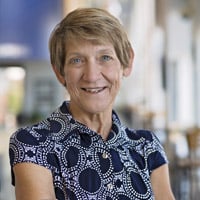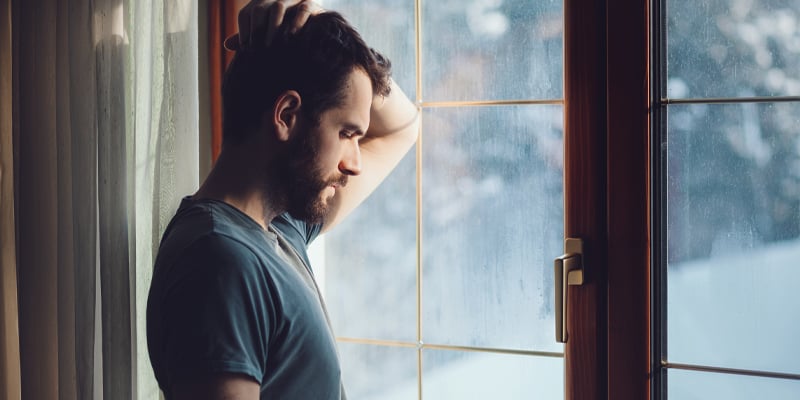Roughly two million Americans were expected to be diagnosed with some form of cancer last year. The American Cancer Society reports that the number could be more than two million in 2024. The National Cancer Institute reports just over 300,000 Americans would be diagnosed with breast cancer in 2023, which is about fifteen percent of cancer diagnoses for the year.
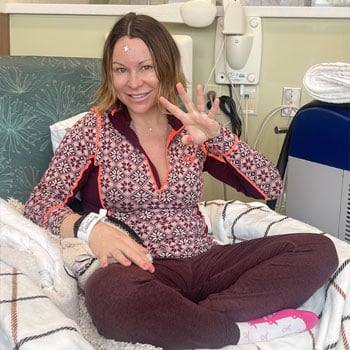 Emily Cheshire, DNP, MS, FNP-BC, receiving cancer treatments. The photos below show Chesire’s acupuncture treatments, which she says help manage fatigue. |
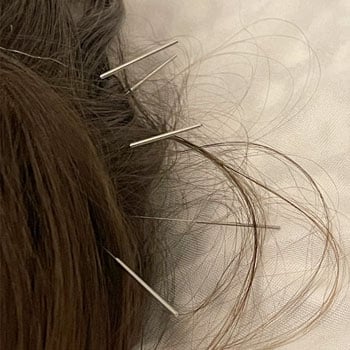 |
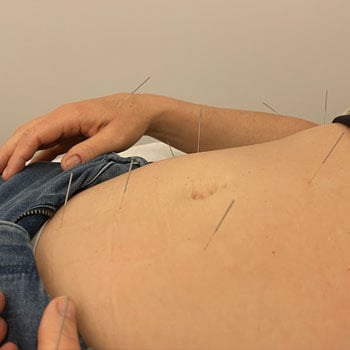 |
Emily Cheshire, DNP, MS, FNP-BC, was one of those Americans diagnosed with breast cancer last year. She is an assistant professor at the University of Colorado College of Nursing at Anschutz Medical Campus.
“I’ve been getting mammograms since age 40 and always get called back for a follow-up so I never think anything of it,” she says. “But this year (in December), I got called back and I could tell that something was different because the radiologist came in and re-did the ultrasound. So I realized it wasn’t my usual callback appointment. The radiologist told me she was seeing something that looked cancerous, and they needed to do a biopsy.”
Cheshire was diagnosed with stage two, triple-negative invasive mammary carcinoma.
“The beginning is the worst because you want all of the answers. You don’t know your staging and your mind goes to a scary place,” she says.
Fatigue During Cancer Treatments
Cheshire’s treatment plan will take about two years with a combination of infusions, chemotherapy, radiation, and surgeries. She started infusion in mid-January.
Her treatments are every Friday and last about seven hours, and she says her energy levels stay healthy during the weekend, but by Monday she feels very fatigued.
“I’m really tired and feel nauseous. When I feel physically fatigued, my mental game shifts downward, which makes me more fatigued, which makes me bluer. It’s cyclical. This is why it’s important for clinicians to have tools to treat fatigue,” she says. “So I make my acupuncture appointments on Mondays because afterward I get a huge energy boost and my mood follows. Getting that treatment really helps holistically.”
According to CU Nursing Professor Catherine Jankowski, PhD, “It can be difficult to put your finger on what’s causing fatigue, but it’s very real.”
Jankowski, who presented on this topic at the National Comprehensive Cancer Network (NCCN) conference in Orlando, FL., says that cancer-related fatigue can affect patients in different ways, and managing fatigue also depends on the patient.
“We’re always looking at building evidence for complementary and alternative treatments. There’s evidence that some treatments are good for some patients, including bright light therapy and acupressure,” she says.
Cheshire has embraced alternative therapies to help her manage not only the stress of her diagnosis but the fatigue that comes with treatments.
Along with acupuncture, Cheshire uses ice packs on her hands and feet and takes L-glutamine and Vitamin B supplements to prevent neuropathy. Her infusion center offers Reiki, provided by certified volunteers during infusions, so she receives a 40-minute Reiki session every Friday. Reiki is a healing method using gentle touch to reduce stress, and anxiety, and encourage relaxation.
“I feel so at peace while I’m at the infusion center, which I don’t think is that common,” she says. “I think it has to do with my 40-minute Reiki session. I’m receiving these highly toxic drugs (during treatment) and I can imagine the chemotherapy eating away my cancer. I think it helps to have that mind-body connection that Reiki offers, while you’re vulnerable, receiving cancer treatments.”
Cheshire also meditates to manage her anger and fear brought on by her cancer diagnosis. And her friend brought her a quartz crystal to keep near her. Her aunt knitted her a prayer blanket that was blessed at their church. She runs every treatment or supplement by her oncology team at UCHealth to ensure it is safe for her to do or take.
“I’m open to any kind of alternative treatment,” she says. “As long as my oncology team says it’s not going to hurt, I’m like ‘Okay, let’s try it’. And if my team doesn’t know, they won’t say ‘no’. They’ll look and find an answer. It’s part of why I love my team at UCHealth. It’s so nice to feel supported.”
Cheshire focused on her cancer treatment team first but then lined up her alternative therapy team. This includes behavior health for herself, couples counseling and for her children, Reiki, acupuncture, meditation, cancer-focused naturopath, and ensured her church attendance was prioritized.
“I’ve been lucky to have minimal chemo side effects so far, and I know it’s because of these practices,” she says.
Studying Cancer-Related Fatigue
“Fatigue is not always associated with chemotherapy or radiation. Although it often is, it’s not necessarily related. Fatigue can be recurring, or it may take a while for it to show up, And it can appear at any time during someone’s cancer diagnosis and treatment,” Jankowski says.
She helped create guidelines for treatment decisions regarding cancer-related fatigue. The guidelines provide physicians with guidance to rule out or identify potential causes of fatigue.
“For example, one way is to look at a patient’s iron status and see if they have an iron deficiency (anemia), then that can be treated. But for many patients, their iron levels may be normal but they’re still feeling very fatigued,” she says.
Giving Patients Options
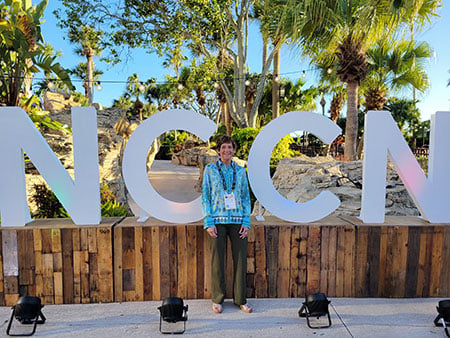
Dr. Jankowski attending the NCCN conference (April 5-7) in Florida. |
Jankowski says the NCCN’s guidelines on cancer-related fatigue are essential because it gives providers different options to give their patients. The NCCN revises guidelines every year, so providers have the most up-to-date information.
“Some treatments might work well in some patients and not others. Some therapies may not be available in all locations, and some may not be covered by insurance, so we want to be sensitive to providing as many options as possible,” Jankowski says.
“There’s a recognition that cancer-related fatigue is very problematic for our patients, and there needs to be a comprehensive assessment protocol,” Jankowski says. “I think all providers are aware of cancer-related fatigue and that it really affects patients. They want to do the best they can because it helps with cancer outcomes. And a patient can have more energy during treatment and during their survivorship.”
Cheshire says it’s been helpful to hear from other patients about what forms of alternative treatments have worked for them because symptoms are so different from patient to patient. Treatments have different effects on patients.
“We’re all on these same treatments, but the symptoms are such a wide range,” she says. “So it’s important that we share what worked for us, and then other patients can ask about them with their oncology team.”
And don’t underestimate the power of prayer.
“I’ve felt a lot of prayers from people, so I feel lifted and supported with that,” she says. “I don’t know if that’s what helps me have a positive attitude or if it’s the other things I do, but this is about finding beauty and something you’re grateful for while living in uncertainty. That comes easier when fatigue is minimal.”

